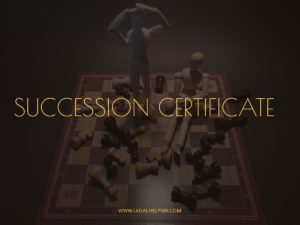 The Indian Succession Act was established to lay down rules regarding the issuing of succession certificates. They are defined as a legally binding certificate that verifies the authenticity or genuineness of an heir once an individual has become deceased. It also gives the heir the right to inherit assets previously owned by the dead. Its scope regarding debts or collateral such as insurance, hedge funds and shares or bonds as issued by the central or state government is limited. Its primary function is to assist the heir in collecting debts that the deceased was entitled to and also to ensure that the succession laws are duly followed. It also affords protection to people paying back their obligations to the recently dead while he or she was alive.
The Indian Succession Act was established to lay down rules regarding the issuing of succession certificates. They are defined as a legally binding certificate that verifies the authenticity or genuineness of an heir once an individual has become deceased. It also gives the heir the right to inherit assets previously owned by the dead. Its scope regarding debts or collateral such as insurance, hedge funds and shares or bonds as issued by the central or state government is limited. Its primary function is to assist the heir in collecting debts that the deceased was entitled to and also to ensure that the succession laws are duly followed. It also affords protection to people paying back their obligations to the recently dead while he or she was alive.
Banks and financial institutions ask for a succession certificate when releasing funds to a certain nominee who might not be registered as the legal beneficiary. In such circumstances, arguments and fights are bound to arise, and it is here that the certificate holds the most value. The document once assessed leads to the resolution of such disputes by legally deciding to whom the money must go to in situations like these. Similarly, it comes handy, when a large inheritance allowance is to be issued, and the heir’s legitimacy has to be validated.
How to obtain a Succession Certificate
-
- The beneficiary must file a petition to procure a certificate at a court.
- The certificate may be granted by a District Judge under whose jurisdiction the property being discussed lies or a Judge under whose authority the deceased lived.
- The petition must mention the name of the beneficiary, his or her relationship with the deceased, names of other heirs and details regarding the death. The death certificate must also be attached to the petition.
- The court will then issue a notice to the concerned parties and publicises a time frame within which objections might be raised by anyone. If no objection is raised, the court issues a certificate to the beneficiary.
- In the case of multiple beneficiaries, a joint certificate is issued. No property will have multiple certificates that are legally binding.
